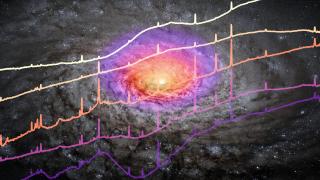Bibcode
Villar Martín, M.; Ramos-Almeida, C.; Tadhunter, C. N.; Bessiere, P. S.
Referencia bibliográfica
Monthly Notices of the Royal Astronomical Society, Volume 438, Issue 2, p.1839-1847
Fecha de publicación:
2
2014
Número de citas
15
Número de citas referidas
15
Descripción
We present deep, intermediate resolution, long-slit Gemini GMOS-S
optical spectra of the Sloan Digital Sky Survey (SDSS) type II quasar
J002531-104022, which is a highly disturbed system currently undergoing
a major merger event. We use these data to model the ages and reddenings
of the stellar populations in three distinct spatial regions and find a
remarkable uniformity in the properties of the young stellar populations
(YSPs) that dominate the optical spectra. The YSPs are all found to have
relatively young ages (tysp < 40 Myr), strongly implying
that the latest episode of star formation and quasar activity have been
triggered quasi-simultaneously. The lack of reddening deduced from both
continuum modelling and the measured Balmer decrements (E(B - V) <
0.3) suggests that starburst and/or active galactic nuclei-induced
outflows have already effectively removed a substantial proportion of
the gas and dust from the central region. These findings starkly
contrast with model predictions which suggest an offset of a few 100 Myr
between the peak of merger-induced star formation and the emergence of
the optically visible quasar activity. Based on our stellar population
fits, we also show that the total stellar mass is in the range (4-17)
× 1010 M⊙, lower than typically found
for quasar host galaxies.
Proyectos relacionados

Actividad Nuclear en Galaxias: una Perspectiva 3D del Núcleo y su Entorno
Nuestro grupo se divide en dos líneas principales de investigación. En primer lugar, el estudio de los vientos producidos por cuásares luminosos oscurecidos y del impacto que estos tienen en sus galaxias anfitrionas (retroalimentación del AGN). Como parte de este proyecto, denominado QSOFEED (Quasar Feedback) hemos obtenido observaciones
Cristina
Ramos Almeida